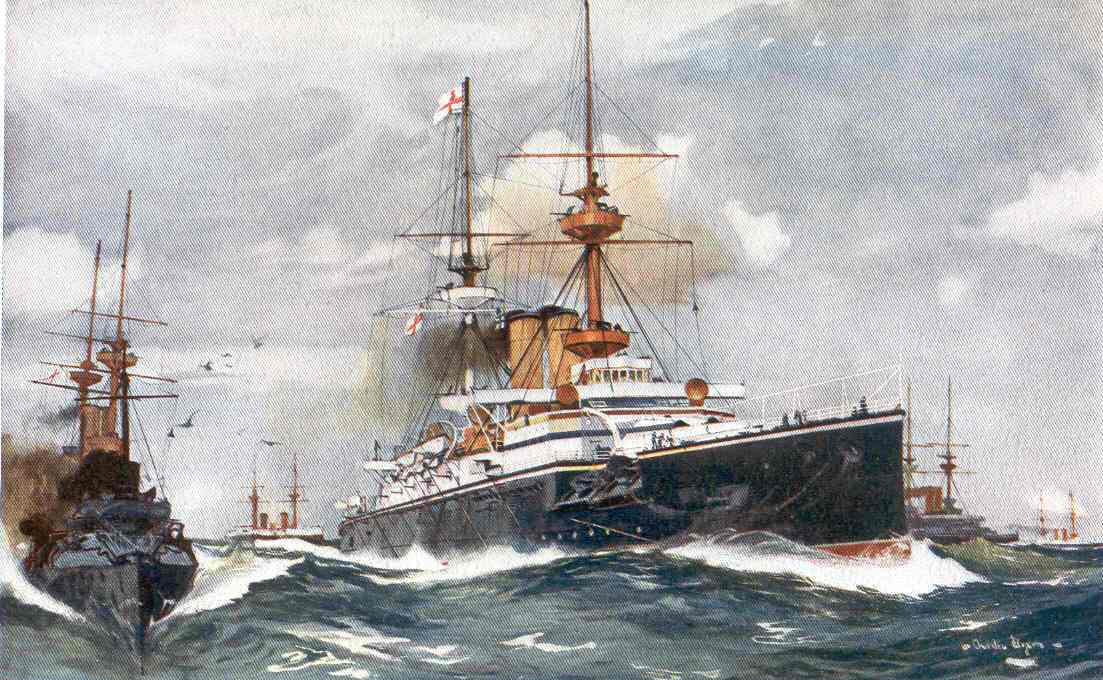Arthur Barrow, son of Commander Barrow, was born on the 25th March 1853 at Burnham in Somerset. He was the second son, and one of seven siblings, his elder brother Arthur Allen having died aged 2½ by the time Arthur was born. His father died when he was 13 years old and at that time a naval cadet in Dartmouth. The training of young officers had begun on the Dart some three years before, the wooden hulk HMS Britannia serving as the training base on the river, alongside HMS Hindostan. By the time he was fifteen Arthur Barrow was appointed a Midshipman on HMS Galatea, the ship captained by Prince Alfred, Duke of Edinburgh and second son of Queen Victoria, which sailed round the world on what might be termed the first ‘Royal World Tour’. His career saw him rise quickly through Sub-lieutenant, Lieutenant, to the rank of Commander in 1880 while on HMS Excellent, a hulk which housed the Royal Navy’s School of Gunnery at Portsmouth immediately before its move ashore to Whale Island. He was promoted Captain in 1890 at the age of 36 and within 3 years became Assistant Director of Naval Intelligence in the Department which had been set up in 1887 by Captain William Henry Hall. He was Flag captain to Lord Walter Kerr, Commander in Chief of the Channel Squadron on the pre-Dreadnought battleship HMS Royal Sovereign in 1895, and subsequently on HMS Majestic, before becoming Captain of HMS Prince George in June 1899. Returning to HMS Excellent he was appointed Naval ADC to the King. At the age of 50 he was a Rear Admiral. It was at this stage of his burgeoning career in 1903 that he had an accident, a bicycle accident which resulted in his requesting he be put on half-pay to recover his health. He remained on half-pay for a further three years before retiring when aged 53, being promoted firstly to Vice Admiral and then Full Admiral on the retired list before his death on 22nd November 1914, a mere three months after Great Britain had declared war on Germany at the start of the ‘Great War’.
Arthur Barrow’s career saw the Victorian navy develop out of all recognition from that of his father. His own experiences covered the massive change in that service from his days on the screw sailing frigate Galatea across the world’s southern oceans – going aloft to haul in the sails, undertaking cutlass drill, roving his hammock, caulking the upper deck, and more – to his captaining two of the Majestic class ships before even they were made obsolete by the advent of the Dreadnought battleship. He lived through this time of apparent stability created by British dominance of the seas, out of which rose a number of larger-than-life, huge personalities – John Arbuthnot ‘Jackie’ Fisher, 1st Sea Lord; Winston Churchill, 1st Lord of the Admiralty; and others – who prepared the Royal Navy for the brewing, devastating conflict, triggered by an assassination in Sarajevo, that was to engulf all from 1914. Although ideally taught and trained in seamanship, gunnery, naval intelligence, authority, and command, with a lifetime’s experience of the sea behind him, it was not for him to become involved, the last part of his career cut short by ill-health and an early death.
